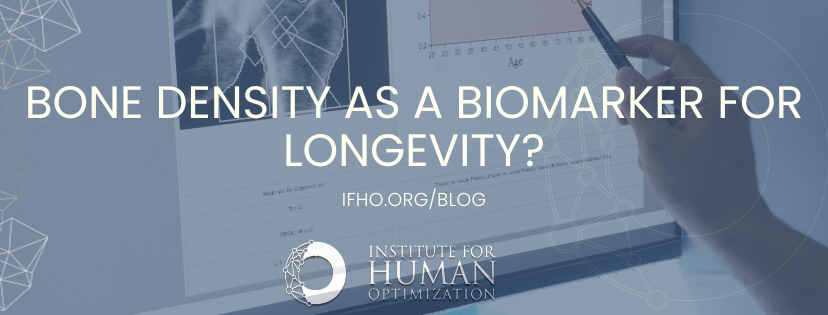Bone Density as a Biomarker for Longevity?
The human body is a complex and fascinating system that is made up of more than 200 bones. These bones serve as the framework for our bodies, giving us shape, support and protection. But aside from their structural role, bones also play a crucial role in our overall health.
One aspect of bone health that is often overlooked is bone density. Bone density refers to the amount of mineral content present in bones, specifically calcium and phosphorus. Lower bone density means that the bones are weaker and more prone to fractures, a condition known as osteoporosis.
Why Bone Density Matters
Having strong and healthy bones is essential for everyday activities such as walking, running, and lifting objects. But beyond these simple movements, bone density also plays a critical role in maintaining our overall health and well-being.
For one, bones act as a reservoir for minerals that our body needs to function properly. Calcium, in particular, is an essential mineral that helps with muscle contraction, nerve signaling, and blood clotting. When the body lacks calcium due to low bone density, the body will take it from the bones, weakening them further. This can lead to a wide range of health problems, including muscle cramps, numbness, and even heart palpitations.
Moreover, bones also play a vital role in regulating the body’s pH levels. Our bodies function best when the blood’s pH is within a narrow window of 7.35 to 7.45. When the body becomes too acidic, it can pull calcium from our bones to neutralize the excess acid. This process can leave the bones depleted of calcium, leading to a decrease in bone density.
Who Is at Risk for Low Bone Density?
While everyone should prioritize maintaining strong and healthy bones, some people are more prone to low bone density than others. These include:
- Women over the age of 50: As women go through menopause, they experience a decrease in estrogen levels. Estrogen helps maintain bone density, so this decrease can lead to a higher risk of osteoporosis.
- Men over the age of 70: Just like women, men also experience hormonal changes as they age. This can cause a gradual loss of bone density, making them more susceptible to osteoporosis.
- Individuals with a sedentary lifestyle: Regular weight-bearing exercises help stimulate bone growth and maintain bone density. People who lead a sedentary lifestyle are at a higher risk of low bone density.
- Individuals with poor nutrition: A diet lacking in essential nutrients, particularly calcium and vitamin D, can significantly impact bone health.
Modifiable Lifestyle Factors
While genetic factors and aging undeniably influence bone density, several lifestyle changes can be made to potentially aid in maintaining or even improving bone health.
- Physical Activity: Regular weight-bearing exercises, such as walking, running, and resistance training, can stimulate bone formation and slow the rate of bone loss. Aim for at least 30 minutes of physical activity most days of the week.
- Diet: Consuming a balanced diet rich in calcium and vitamin D is crucial for bone health. Foods like fish and leafy green vegetables are excellent sources of calcium, while sunlight and fatty fish can provide vitamin D.
- Alcohol and Smoking: Excessive alcohol and tobacco use has been linked to decreased bone density. Limiting alcohol consumption and avoiding tobacco can help maintain bone health.
- Maintain a Healthy Weight: Extremes in body weight—either too low or too high—can decrease bone density. Maintaining a healthy weight through balanced nutrition and regular exercise can support bone health.
Measuring Bone Density
Bone density can be measured through a painless and non-invasive procedure called a bone mineral density (BMD) test. The most common method used is dual-energy X-ray absorptiometry (DEXA), which measures the amount of X-rays that pass through the bones.
It is recommended to undergo BMD testing for individuals at high risk of osteoporosis, such as postmenopausal women and men over the age of 70. It is also advisable for those who have a family history of osteoporosis or have had fractures in the past. At the Institute for Human Optimization, we recommend a DEXA scan in part of our longevity programs and for individuals over 40. Why? Our goal is to keep our patients moving and active for the long haul. This data is invaluable and should be tracked longitudinally. As part of the goal for optimal health, we want to ensure that their bones are as strong and healthy as possible.

Understanding Osteoporosis
As we age, our bodies go through various changes, including a decrease in bone density. This is a natural part of aging that happens to everyone. However, some people experience significant loss of bone density, leading to a condition called osteoporosis.
Osteoporosis is a disease that causes bones to become weak and brittle, making them more susceptible to fractures. It is often referred to as the “silent disease” because it progresses without any symptoms until a fracture occurs. This makes it crucial for individuals to prioritize bone health and take steps to prevent or manage osteoporosis
Osteoporosis is not an easy condition to live with. It can lead to severe pain, decreased mobility, and a lower quality of life. Early intervention is key to preventing or managing osteoporosis. This involves regular bone density screenings, a balanced diet rich in calcium and vitamin D, and an active lifestyle that includes weight-bearing exercises. By understanding the importance of bone density and taking proactive measures to maintain it, we can ensure our bones stay strong and healthy for years to come.
Bone Density and Longevity
Bone density has a strong correlation with longevity. Research has shown that individuals with higher bone density are likely to live longer, as the strength and integrity of our skeletal system directly impacts our overall health. Our bones are the body’s primary storage site for calcium—a key nutrient for heart function, muscle contractions, and blood clotting. If our bone density is compromised, these functions can be adversely affected, potentially leading to a decline in general health and a shorter lifespan.
Finally, it’s worth noting that high bone density reflects a healthier lifestyle—adequate nutrition, regular physical activity, and good overall health—all of which are associated with a longer, healthier life. Hence, bone density can be seen as a marker of our overall health status and longevity.
Bone density is an often overlooked aspect of overall health, but it plays a crucial role in maintaining our bodies’ proper functioning. While some factors like genetics and aging are inevitable, making healthy lifestyle choices can significantly impact bone density and reduce the risk of developing osteoporosis. By prioritizing physical activity, nutrition, and avoiding harmful habits, we can help keep the integrity of our bones for optimal health and longevity. Regular bone density screenings are also recommended for early detection and management of osteoporosis. With this knowledge, we can take proactive measures to maintain strong, healthy bones and enhance our overall well-being. So, it’s essential to prioritize bone density in our journey towards a long and healthy life.
REFERENCES
. . .
At the Institute for Human Optimization, we are a Maryland based Precision Medicine & Longevity Medicine practice that partners with you to become your health intelligence partner with the goal of optimizing your health. We accomplish this with our signature precision medicine approach. Led by Dr. Anil Bajnath, author of the Longevity Equation, we use a combination of therapies that are tailored to your specific needs with a health optimization goal. We make use of the latest scientific research to offer our patients personalized medicine, based on real data. We call this precision health and it is the future of healthcare.
Our focus is not only looking at the root cause, but also to measure, quantify and optimize the patient’s personal health. We take a preventative approach, personalized, proactive, and precise approach in helping our patients control their risk factors early on in order to avoid chronic illness down the road. Our team use a comprehensive approach with every patient that comes into our office, looking at all aspects of health including lifestyle, environment and genetics. There are no generic one size fit all protocols. We empower our patients with the right tools and information, so they can take control of their own health. This is the future of longevity!





Leave a Reply
Want to join the discussion?Feel free to contribute!